Kate Meadows's Blog, page 4
December 19, 2022
What’s Your Word for 2023?
Recently I attended a local women’s networking luncheon. The event organizers asked all women in attendance the same question:
What’s your WORD for 2023?
A local artist was on hand, standing next to an easel and square canvas, and as we wrote down our words and brought them to her, she painted them onto the canvas into what would become a piece of inspirational art for the year to come.
 Photo by Cup of Couple on Pexels.com
Photo by Cup of Couple on Pexels.comWhen I encountered the question – what’s your word? – analysis paralysis set in for me at first. One word? For a whole year? That’s a lot of pressure. And I sure didn’t want to pigeonhole myself into goals that were too narrow.
But I had walked this road before. In 2020 (yes, that 2020), my word was steadfast. It was a word that found me, and not the other way around. Moments continually presented themselves as challenges: stay the course, I found myself saying over and over. Stay the course.
A focus word is like an anchor, keeping you grounded in a vision or goal you set for yourself. You can turn to it as you are planning out your day or your week. You can use it as a guide for decision-making, a rudder when you reach a fork in the road.
Today, I want to challenge you to consider a focus word of your own for 2023. Don’t overthink it.
What is one word that intrigues you, or one word that seems to continually show up for you lately?
Write it down. Think on it.
How can you use that word to make progress and move forward in 2023?
If you are a writer, I invite you to register for my free webinar, “Clarify Your Writing Goals for 2023.” The webinar will take place on Jan. 7, 2023, at 9 a.m. MST. I’ll encourage you to identify 2-3 writing goals for 2023 and name the hurdles that might threaten those goals. Together, we’ll consider ways to overcome your roadblocks, and you’ll receive a “road map” with specific steps to help you accomplish your writing goals in 2023. You can register for the webinar here. The event will be recorded, so even if you can’t make it live, go ahead and register and then watch the replay at your convenience!
Back to your word for 2023. When you are ready, I would love if you would SHARE that word with me. I’ll collect words from my newsletter subscribers and design a word cloud to showcase YOUR words for 2023. I’ll send the word cloud in a special email on Jan. 1, 2023, to everyone who participates. I’ll also feature it right here on my blog. Feel free to pass the challenge along to your friends and family!
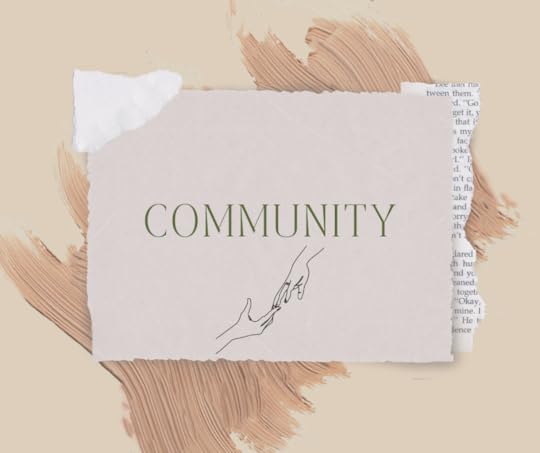
I didn’t have to think hard about my word for 2023. It’s community. Because I want the work I do in the coming year to be focused on building community for writers and creating spaces and opportunities for writers to come together, challenge one another, produce work and grow in the craft. I’ll be rolling out some unique opportunities in that vein in the near future. Stay tuned! But for now, think about your focus word for 2023 and share yours with me. I can’t wait to see what we create!
October 17, 2022
Follow the Thread: Writing as an Act of Faith
When I started writing the essays that would eventually become my first book, Tough Love: A Wyoming Childhood, I did not have a concrete vision of what the book would be about. All I knew was that I had a lot of childhood memories inside of me – good and bad and fun-loving and challenging – and a lot of people had done their fair share in shaping those memories. There was a lot to explore. Those memories and stories were pounding inside me, pleading to be let out, pleading to be set free.
The stories were timid at first, sweet and innocent moments of my childhood. They were special to me, but to a stranger, they meant little. Readers who didn’t know me needed a reason to care about what they were reading. Who is this Kate Meadows? And what is so remarkable about her life?
I certainly could not have answered those questions in the early stages of writing the book. Those simple, innocent memories were strong, and I knew I wanted to explore them on the page, but why? I didn’t know. I needed the writing itself to tell me.

The more I worked at the stories, the more prominent a larger theme became. As I continued to write and revise, write and revise, I realized I was venturing into unexplored territory: the essays were becoming an exploration of my complex emotions toward and relationship with my grandparents.
Now that, I never intended.
I fought the impulse at first. No, I argued with myself. That’s not the direction I want to go.
But the writing kept leading me that way. A major detail was missing in those low-stakes stories about my childhood memories: Readers needed a reason to care.
 Photo by chepté cormani on Pexels.com
Photo by chepté cormani on Pexels.comWithout meatier substance, the sweet little memories I was writing about were just that: sweet little memories. They mattered to me, but if you had no idea who I was and I asked you to read a book about my favorite childhood memories, what would you say?
You’d probably say, “Why?”
As I thought about the deeper meaning behind these memories, I started venturing down the tunnel of my grandparents’ roles in them. Much as I wanted to fight it (there was some hard and ugly stuff there that for all intents and purposes could have stayed well and buried), my mind – and my proverbial pen – kept wandering into that territory.
Trust me, the writing seemed to be saying.
The writing was hard. It was agonizing at times. It scared me. Some sentences I pounded out through tears. To see my thoughts, black and real, staring back at me from the computer screen was at once alarming and freeing.
I didn’t know it at first, but in this act of writing I was communicating and coming to terms with some hard truths. I was knitting together a story I never actually set out to tell. But it was, I realized through the process, the story that needed telling. Among the thorns and roses of memory, a story of complex love emerged.
A story of complex love, messy with mistakes and emotions and raw beauty.
A collection of one girl’s innocent childhood memories.
Which is the story you’d be more likely to read?
So often, writing is an act of faith. You recognize a single loose end of a thread and you start to pull it, unsure of how it’s going to unravel. The writing becomes an act of discovery. You don’t know where you’re going. You don’t know where you’ll end up. All you know is that you have to keep going.
That’s faith. It’s having the courage to take the next step, even though the rest of the path is still dark. Sometimes, you only have enough light to see directly in front of you.
Keep going.
Through the tough writing and the unraveling of some momentous events that, years after taking place still needed mining, I finally set a complete story free. Tough Love: A Wyoming Childhood (Pronghorn Press 2012), recounts my years as an only child growing up in the harsh and untamed country of western Wyoming, being molded by and learning to love the very people – those grisly, fiercely independent characters – who you’d think would have been the least likely to teach me about life’s greatest gift.
Without faith – without a willingness to discover, that story would still be buried, never explored, never told. The work started innocently. To be sure, my recounting of my childhood memories was no waste of time. It just wasn’t the final destination. It was the steppingstone I needed to get to what really mattered.
Is there a thread in your writing that you need to follow, in an act of blind faith? Where is your writing leading you right now? Share in the comments or email me at kate@katemeadows.com.
October 3, 2022
The South Dakota Festival of Books: From the Front Lines
Last weekend, I attended the South Dakota Festival of Books in Brookings, SD. For two days, I talked about writing and books with dozens of writers and book lovers from South Dakota and surrounding states. I sold a few books. I sold some t-shirts and stickers (you know you’re a writer if you “get” the motto on my t-shirts and stickers, “BUT FIRST, WRITE“) and handed out plenty of business cards.
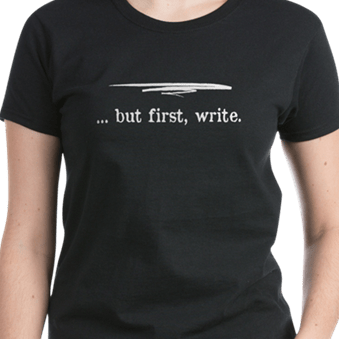 https://katemeadows.com/resources-for-writers/merchandise/t-shirt-but-first-write/
https://katemeadows.com/resources-for-writers/merchandise/t-shirt-but-first-write/But the most rewarding, worthwhile experience at the book festival? It was the conversations around creative projects I had with total strangers.
There was the young college student who had finished her first novel and wondered what advice I had for publishing it. There was the grandmother whose 13-year-old granddaughter loves to write and is looking for ways to meet other teenage writers. There was the retired English teacher who is writing full time now, submitting her work to various publications, and being rejected left and right.
“I am collecting a lot of ‘No’s’ right now,” she told me matter-of-factly. “It’s my job.”
I wanted to sound the victory music for her. She understands that, when it comes to publishing your work, rejection is the name of the game. She collects no’s, and she keeps writing. That is the mark of a writer.
Toward the end of the second day, two women approached my table, curious about my book coaching services. When I asked what brought them to the festival, one replied, “My grandmother is receiving a state poetry award tonight.”
My heart swelled for her. Here she was, about to share an unforgettable moment with her grandmother.
Then, she told me the reward was posthumous.
Her grandmother died before she was born. She never knew her.
Except she did. How?
Through her grandmother’s written words.
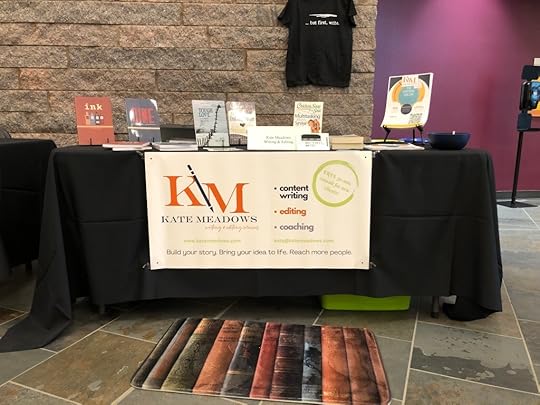
It was a perfect testament, I thought, to why writing matters. There are many reasons why writing matters – many reasons why we write – and writing to connect with generations who come after you is a tremendous one. This young woman, this granddaughter, at the Book Festival, grew up with her grandmother’s poetry, her grandmother’s words. Because her grandmother wrote, she was not a stranger to her granddaughter, even in death.
Have you ever thought about writing that way, as a way to connect with or encourage those who come after you?
Public events like the South Dakota Book Festival are excellent opportunities to meet new people with similar interests, collaborate with like-minded people on projects, be exposed to new ideas and possibilities. I came home with a full heart, a racing mind and a fresh energy to keep at the work I’m doing.
Have you attended a conference or other public event lately that you would recommend to writers in our community? Please share!
September 19, 2022
4 Reasons Why You Shouldn’t be Your Own Editor
Recently I came across a post on social media. To paraphrase, the writer said she was soon to finish a work-in-progress for publication, but she was struggling with editing.
“It’s so funny!” she wrote. “I can edit someone else’s work and catch every mistake, but when it comes to my own writing I end up making the same errors I catch in the work of others.”
Can you relate?
A writer should never be the final editor of her own work. Why? Here are 4 reasons:
1. We all have blind spots when it comes to our own writing.Your sentences might sing. Your characters might glow. But if you do not seek an outside eye to give your work a once-over before you kick it out of the nest, you are doing yourself and your writing a disservice.
When I was working on my book, Faith to Follow: The Journey of Becoming a Pastor’s Wife, I shared draft chapters with my mother-in-law. I had written and rewritten and spit-shined each chapter before I sent it to her, but I fully expected she would find errors here and there that I missed.
I was right.
One of the most glaring errors she caught was a reference I made to Idaho, east of my home state of Wyoming.
You read that right. East.
One simple correction from an outside reader – made all the difference. She crossed out “east” and replaced it with “west.”
I was mortified that I had made such a glaring mistake – and that I hadn’t caught it on my own! But more than that, I was so grateful that she caught my mistake before the book was published. In all of the scrutiny I applied to my own work, in the multiple times I had gone over my book draft with a fine-toothed comb, my mention of Idaho being east of Wyoming never jumped out at me.
It was a blind spot.
If you believe your writing is the best it can be yet no one else has read it but you, think again. I would challenge you every time: there is always something in your writing that can be improved, and you as the writer will not always see it.
2. You overlook more typos than you think.No writer is perfect because every writer is human. Even the most skilled and accomplished writers make mistakes. Errors are inevitable, from innocent typos to bigger errors that the writer’s tired eyes fail to catch. You can read a piece of writing a hundred times and something will still sneak by you (Idaho being east of Wyoming: case-in-point, ahem).
A good editor will catch those errors right away. That’s the advantage of fresh perspective. Embrace it, because two sets of eyes are always better than one.
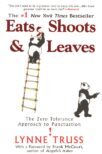
You might roll your eyes at discussions on the importance of the comma or wonder why double-checking spelling and punctuation is such a big deal.
Lynn Truss wrote a whole book on this, and it’s excellent (not to mention wildly entertaining). Consider the significance of the comma in the very title. On the cover, a panda bear is diligently erasing the comma between “Eats” and “Shoots.” The absence of the comma turns the word “shoots” from a verb into a noun. That’s pretty powerful stuff.
Perhaps you’ve heard it before: Commas save lives.
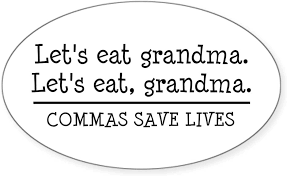 3. Feedback is a critical part of the writing process.
3. Feedback is a critical part of the writing process. As writers, we need feedback for our work. I have always been a firm believer that feedback has two parts: what’s working and what’s not working.
The writer Allison K. Williams says, “Purely nurturing feedback is unhelpful. Straight criticism is discouraging. An editor must identify what’s wrong, clarify why it must be fixed, and excite the author to do the work.”
Those are huge tasks! Authors can’t always see what’s wrong with their work because they are working through their story, synthesizing ideas, and building up a narrative.
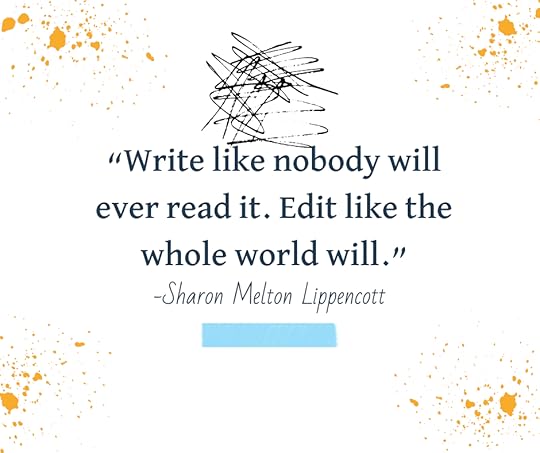
That’s where a good editor comes in. A good editor won’t simply give you praises and accolades. She also won’t strictly dump harsh and unsupportive feedback on you. A good editor is focused on making your work the best it can be. Her feedback should leave you feeling inspired and energized to keep working toward a final draft because with her help you see even more potential in your work. You believe in your work more because of the feedback your editor provided. And, you feel more confident to share it with the world.
Sharon Melton Lippencott said, “Write like nobody will ever read it. Edit like the whole world will.”
4. Seeking help demonstrates humility and desire for growth.I love it when clients come to me acknowledging that there are problems in their story or essay that they can’t see. To me, acknowledging that you as the writer don’t have all the answers shows a great level of humility and a desire to grow as a writer. Reaching outside yourself and your own creative process – being brave enough to “let go” – is one of the greatest acts of love you can give to your work.
Strong writers are always open to learning more about their craft. Growing as a writer means you’re eager for the input and feedback that will help you through the rewriting process. It doesn’t mean you have to accept or implement every shred of feedback you receive. But it does mean you will begin to look at your work from other angles and learn to ask questions that will help shape it – and your distinct voice as a writer.
A good editor is someone you can learn from. She knows how to balance your voice
and your vision with the needs of your audience. Think of every cut,
suggestion, or tweak as a moment to consider how others might respond to your
words, and how what you see as the writer might be different than what a reader
sees.
There are many ways to find new eyes for your work-in-progress. Consider joining a
writing group or seeking an accountability partner who will offer valuable
feedback. These opportunities and more are available for free in my online
writing network, The Writers Salon. To learn more about group coaching,
one-on-one coaching or editing, check out my Editing Services page or
contact me for a free 30-minute consult.
You can also check out this post at nybookeditors.com, on 12 reasons why you need
a professional editor.
Shannon Hale wrote: “I’m writing a first draft and reminding myself that I’m simply
shoveling sand into a box so that later I can build castles.”
Castles aren’t built by just one person. Seek outside hands and expert eyes, and your castle will eventually be a place where a whole community of readers wants to be.

Want more ideas and opportunities for how to improve your writing, set a foundational writing practice, receive feedback on your work and more? Subscribe to my newsletter!
Kate Meadows Writing & Editing
Build your story * Bring your idea to life * Reach more people
August 28, 2022
Is My Writing Good Enough?
NOTE: I met Annia Napier, a young writer in Rapid City, around Christmas of 2020 after her aunt reached out to me, asking if she could pay for her niece to receive a writing coach session from me. Annia, then 15, had completed the draft of one novel and was cranking away on the second. But apart from her supportive family, she didn’t have anyone with whom she could really talk writing and explore the often evasive mysteries of the creative process.
Fast-forward to the present, and I have a working relationship with a young writer who is as hungry to learn about writing as she is persistent in her charge to continually get better. In Annia, I see myself as a teenager. I recognize the determination and uncertainty, the dogged desire to succeed and the importance of receiving persistent encouragement from the adults in her midst.
Were it not for the few adults who believed in me and my passion as a teenager, I never would have pursued writing as a career. It would have been too easy to throw in the towel, convince myself that I wasn’t good enough to succeed, tell myself that no one cared about what I wrote, anyway.
Annia’s creative energy, curiosities about life and incredible self-motivation are refreshing and inspirational. In this month’s blog post, she explores the pesky comparison game and that age-old question: Is my writing good enough?
Thank you for reading!
-Kate
Comparison is something that we all struggle with. Whether you realize it or not, you compare yourself to others every day. How do you stack up—in ability, in looks, in how much you have, in your work?
I’ve struggled with comparison in many parts of my life, but there’s one area that I wrestle with the most—my writing. Sometimes I hold my unfinished work up against projects completed by much more experienced people – people like Suzanne Collins, author of The Hunger Games.
When I compare myself to these great successes, I wonder, is my work good enough?
I compare movies to movies and books to books because I’m interested in discovering what makes a story good or bad. What draws people to various stories? Why are some people interested in one story and others are interested in a completely different story?
And who, I have to ask myself, am I writing for? Certainly I can’t be writing for everybody. In the comparison game, I have to accept that some people will love the stories I write and some people won’t, and that’s okay. I didn’t start writing for everyone in the first place, and I have to remind myself of that. I started writing because I loved it, not because I hoped other people would.
But, I also want to share my work with others, and I want people to enjoy it. If they don’t, then what’s the point? (Kate’s online course, “Why I Write,” encourages us all to think critically about why writing is important to us, why we must do it.) Well, I’ve summed it up to this. If many people hate my work but one person absolutely loves it, then my writing is worth it. If my work moves one person or changes one life, it has a purpose. That purpose is not just to please. It is not just to astonish or entertain; it is to change. That’s what I strive for. That’s why I write. I want to be real with my stories to create real change—in fiction, that is.
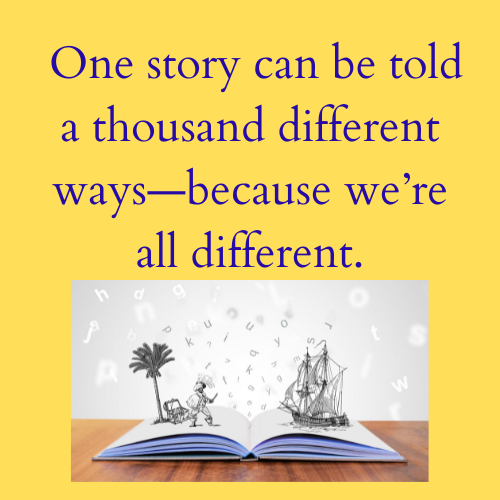 One story can be told a thousand different ways.
One story can be told a thousand different ways.I’ve compared my ideas to others’ ideas and compared my experiences to others’ experiences, trying to figure out what makes a story “good.”
I’ve found that movie reviews have helped me improve, because they help me to think critically about what makes a good story. But reviews can also cast a shadow, sending me back to that persistent question, Is my work good enough?
I am a young writer – still in my teens – and I want to use that to my advantage. The older I get, the longer my writing projects take. But that’s not a bad thing. I think they take longer because I’m getting better. I’m realizing more and more what makes a good story and how to make my stories stand out from all the noise. I want to create something that no one has ever seen before. I don’t want to be cliche.
Yet sometimes, others’ creative projects bring out the jealousy in me. What if I’m not as good, not as creative, not as persistent as they are? What if my work will never turn out as good because someone else’s is always better? What if I’m not saying anything new?
But there is a flip side. Where would my inspiration come from if it weren’t for those phenomenal stories? If I really think about it, there will always be someone better. There will always be a writer better than me. There will always be a story better than mine.
But “better” is a relative term. As creatives, we have to accept that we’re different. We have to believe that we have something unique to share with the world. One story can be told a thousand different ways—because we’re all different.
And that itself is a gift. Because if we were all the same, can you imagine how bland our world would be?
We need each other—and we need stories across all realms of space and time—to encourage and lift up and entertain and challenge. We need stories to fuel each other’s creativity, to inspire change.
Because really, that’s what life is—a mishmash of stories, memories, what-ifs, an explosion of color and possibility.
Life shouldn’t be about constant comparison. It shouldn’t be a game of who is better than who. Rather, let’s celebrate who we are as unique human beings—creative people with a collective, amazing kaleidoscope of ideas and ways to make our mark in our own corners of the world.
As I heard someone once say, “Don’t compare your seed to a tree.”
*Do you compare your creative work to others’? How often do you bump up against that question, “Is my writing good enough?“
July 26, 2022
Why do you Write?
Why do you write?
Have you ever paused to ask yourself that question?
When I was in graduate school, a professor turned that question into an assignment. I saw it for what it was right away: a deceptively difficult question. Like many things, I had fragments of ideas about it in my mind. But trying to turn those ideas loose on the page? Watch out! Answering the question “Why I write” in some ways felt like unleashing a an over-excited dog.
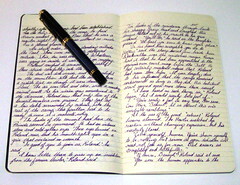 Journal
JournalThere are many ways to answer that question, “Why do you write?”. You might write to make sense of the world around you. You might write to test different ideas and possibilities through the playground of your imagination, asking over and over again, what if? Maybe you want to connect with other people and share your experiences. Or perhaps you write to create a record of your existence, a way of saying I was here.
The question seems easy, but it’s not. Answering it can feel like trying to hit a moving target. But I want to tell you something: It is a question absolutely worth pursuing, a question worth trying to answer.
How have other writers answered this question?
For decades–heck, for centuries–writers have grappled with this question.
A few years ago, author and book coach Jonathan Gunson posed the question “Why do you write?” in a blog post. More than 350 readers responded. Here are just a few of the responses:
“It’s an affliction. Like a twitch I’m trying to control.”
“Because there is a story on my mind that I have to share with the world.”
“Because what percolates inside deserves a voice.”
“It’s the one thing that has consistently called me, my entire life. It’s also how I make meaning in my world.”
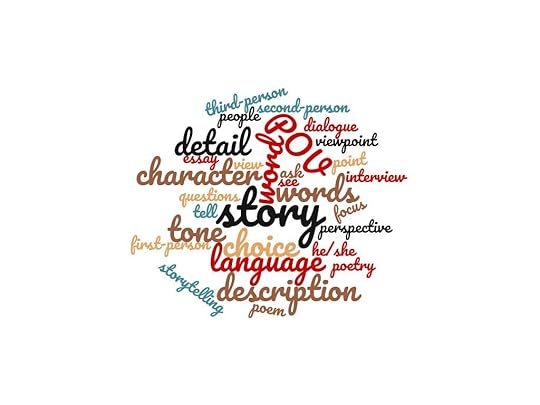
George Orwell, writing a few decades before Didion, believed that writing was part of his true nature. He couldn’t help but write. The real question became what to write and why. He found himself writing politically motivated novels because it connected his drive to write with a larger sense of purpose. Otherwise, his writing felt lifeless.
If you’re like Stephen King, you write “for the pure joy of the thing.”
What would you say? How would you answer the question?
Clearly, there are as many answers to “Why I write” as there are people who take a stab at the question. Coming up with your own answer can seem futile. It can feel pointless as you grasp for words and attempt to put coherent, meaningful thoughts on the page.
But taking the time to think through this question can also give you a greater sense of purpose. It can fuel motivation like it did for Orwell, or offer a sense of clarity like it did for Didion. Allow yourself the space to explore why you write, and you begin to develop a road map, a mission statement.
Then, when you set out to write, you’re more likely to stop making excuses and commit.
I write because I can’t not write. I write to connect people through story and expression. I write because, at its core, writing is about communicating.
When you link your desire to write with a purpose for writing, you’ll have a stronger understanding for why writing is important to you. Maybe the next time life starts to get in the way, you won’t give in to all those excuses not to write.
Are you ready to answer the question, “Why do I write?”
If so, I invite you to join me in an upcoming “Why I Write” live course on Aug. 2. We’ll explore more in depth others’ responses to the question, create road maps together. You’ll come away with your own “Why I Write” piece – and you’ll have an opportunity to seek feedback on it if you wish.
Register here. When you can confidently assert what makes you a writer and boldly state why you write, the words and the ideas you put out there will have a clearer sense of direction.
January 17, 2022
Music: A Gateway to Writing
NOTE: I met Annia Napier, a young writer in Rapid City, around Christmas of 2020 after her aunt reached out to me, asking if she could pay for her niece to receive a writing coach session from me. Annia, then 15, had completed the draft of one novel and was cranking away on the second. But apart from her supportive family, she didn’t have anyone with whom she could really talk writing and explore the often evasive mysteries of the creative process.
Fast-forward to the present, and I have a working relationship with a young writer who is as hungry to learn about writing as she is persistent in her charge to continually get better. In Annia, I see myself as a teenager. I recognize the determination and uncertainty, the dogged desire to succeed and the importance of receiving persistent encouragement from the adults in her midst.
Were it not for the few adults who believed in me and my passion as a teenager, I never would have pursued writing as a career. It would have been too easy to throw in the towel, convince myself that I wasn’t good enough to succeed, tell myself that no one cared about what I wrote, anyway.
Annia’s creative energy, curiosities about life and incredible self-motivation are refreshing and inspirational. In this month’s blog post, she explores how music is a tool that opens new doors to creative endeavors and possibilities. What resonates with you?
-Kate
What made you decide you want to write?
If you’re a writer, there’s a good chance you’ve been asked this question.
I don’t hesitate with my answer. I write because of music.
Music means many things to many people. Listening to an uplifting tune on a gloomy day can change your attitude completely, making it feel like the sun rises just for you. Turning on a powerful song can help you endure difficult times. I love to play music that fits my current mood, because with music I feel more complete. Music, I’m pretty sure, understands me.
Henry Wadsworth Longfellow once said, “Music is the universal language of mankind.”
 Photo by hermaion on Pexels.com
Photo by hermaion on Pexels.comNo matter how old you are, where you’re from, or what language you speak, you can be touched by music. Often, music can even speak to us in ways that words cannot.
Have you ever experienced music so extraordinary and stunning it gives you goosebumps or puts tears in your eyes? This has happened to me many times, and I never get tired of it. Sometimes, it is in these magical moments for me where big-brain ideas begin to spark. When I listen to a new melody that moves me in unexpected ways, I long for the experience again, and I add the song to my array of playlists.
Many of my ideas come during the night. When I can’t sleep, I’ll turn on a tune. As I lay back with the headphones over my ears, whole worlds will literally open up. My mind can’t be still. It’s as if the music demands scenes to be choreographed with it.
Is this torture? Not exactly. In a way, I’d call it a gift.
Music is constant. It is always near me. I welcome it when I’m looking out a car window, watching the outside world pass by. I welcome it as background noise in a busy restaurant and at gatherings of friends and family.
I used to listen to music with lyrics. But now, when I am hungry for story ideas, I almost always listen to instrumental music for inspiration. When I’m building a world no one else can see but me, I lean on instrumental music to help inspire the character development in whatever it is I’m working on. The music helps me to connect with my characters’ emotions. I can get to know them on a deeper level. This concentrated creative time helps me to make my scenes and action come alive. I can dig deep, even if I find I am lacking the words to explain what is happening in a particular scene or what struggle a character is having. In the moment, the music explains it for me. I let the story unfold before me, and I allow the music to inform might happen next.
 Photo by Fernando Arcos on Pexels.com
Photo by Fernando Arcos on Pexels.comI might see a battle breaking out between a protagonist and a villain when I listen to intense, bass-heavy music where one beat seems to leap over the other as if they were in competition. During a crisp piano solo or a doleful choir of violins, I might imagine the hero’s love-interest on the brink of death—the moment where the hero hits rock bottom. Harmonious voices backed by bold, glorious drums and a cacophony of instruments might lead to all characters standing together, united.
My favorite part of any song is the intense instrumental build-up that seems to place the listener on an emotional rollercoaster. You ride that rollercoaster until, BANG! You’re struck with the most beautiful, impeccable and unexplainable moment in the melody, and you can’t think of anything except how the goosebumps crawl all over your arms and legs. And although this is the time where I try to sit still, it’s nearly impossible for me. How can I remain unmovable after hearing a moment of music that rocks the very core of my soul? It’s too good to be true when the music, the idea and the imaginary scene come together perfectly. That is where the gift is.
All that matters in that moment is that I capture the scene, the character dialogue, the movement – whatever sparks of creativity the music gifted me – before I drift off to sleep and forget all about it.
One of my biggest fears is losing all of my work to a sudden malfunction or even to a hacker deleting all the words that took hours upon hours of time and energy-draining work to write. Sometimes, I regret not writing an idea down.
If you have an idea worth keeping, write it down immediately. You don’t want to start working on your project one day and realize you should have kept that single idea, but it’s already fallen into the void of your memories, long forgotten. Don’t trust yourself enough to remember the ideas on your own. Trust me, it’s one of the worst experiences to assure yourself you’ll remember an idea when you need it (without writing it down), only to realize that, when you do need it, it has eluded you. It is the most helpless feeling to realize that the one idea you never wrote down would have been the perfect solution to connect all the dots. What’s more, when you don’t write the idea down right away, you’ll never remember it the same way it came to you originally.
Your ideas are not songs. You can’t play them over again whenever you feel like it. You can’t listen to them the same way you heard them the first time.
Music is a gift that can nourish a creative spirit. Be ready for surprise, for suspense, for unexpected turns along your writing journey. Because when the muse gets to work, there’s no telling what might happen.
December 3, 2021
5 Unique Gift Ideas for the Creative Person in Your Life
With gift-giving season thrumming, what gifts have you planned for the creative person in your life? “Creative” covers a whole lot of ground, I know. In my family, we have two proven artists (one who is under age 10 and one who is over 40), two skilled woodworkers, a photographer, two unmatched readers, and the list goes on. You could probably come up with a similar list in your own circle.
 “Wood shavings” by faungg’s photos is licensed under CC BY-ND 2.0
“Wood shavings” by faungg’s photos is licensed under CC BY-ND 2.0Supplies might be the easy gifts to give. Wood for the woodworker, fresh colored pencils for the artist, new books for the avid readers. Yet the supply chain shortages and the rising cost of postage will make gift giving a particularly stressful challenge for many this year. There’s certainly nothing wrong with the old standards. But what if you took gift-giving a step further this year and challenged yourself to (like a creative person) think outside the box?
Here are 5 creative gift ideas for the creative person in your life that are not tied to the choked supply chain and that won’t break your bank at the post office:
1) Gift a local experience. What activity would the creative person in your life love to experience but probably would not spend money on herself? Consider paying for a visit to a local museum, booking an escape room, planning a food tour, paying for an hour of go kart racing or an evening of painting pottery. No matter where you are, you can always find something uniquely local. Here are 26 unique experience gifts to consider.
2) Gift time with you. Create a snazzy certificate that’s good for one hour, or one afternoon, or one day with you! Think of an activity you and your creative person enjoy doing and decorate the certificate around that theme. Plan a hike, book a manicure, schedule an afternoon for downtown shopping, grab a beer at a local pub and spend some quality time catching up. The possibilities are endless. Offering your time in intentional ways goes a long toward showing a loved one how much you care.
3) Gift help with a specific project. What projects does the creative person in your life have on his plate? Maybe he is planning a kitchen remodel, building a deck, re-designing an office or organizing years of family photos. Think of specific ways you could help this person move forward on that project. If you’re skilled in the tools of the trade, offer your tools and your hands. If the skills themselves are not your forte, offer to provide lunch or dinner on a day he plans to work on his project. Offer to keep the creative person in your life accountable for a project he has set out to do. You will learn more about what’s important to him, and he will see that you care about what’s important to him.
4) Gift a day of community service. What community or social issues does the creative person in your life care about? If she’s on a mission to save the planet, plan a trash pick-up day with her around town (and top it off with a yummy meal at a local restaurant). Does she care deeply about the homeless population? Schedule a time to volunteer at or bring food to a local homeless shelter. You can present this gift as an activity the two of you would plan to do together, or you can present it as a gift dedicated to the creative person in your life (for example, a certificate that makes it clear that you are doing something in her honor). Here are 70 ideas for community service projects.
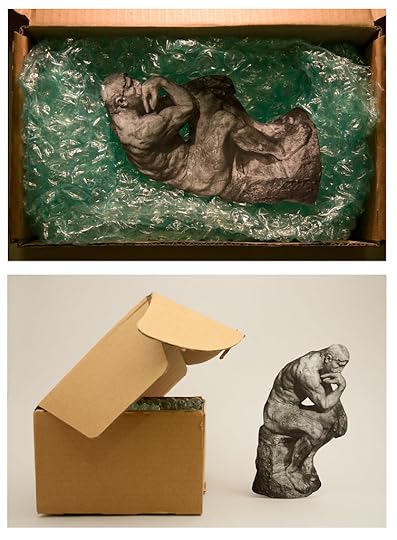 “Think Outside The Box (Evidence & Metaphor)” by Marty Portier is licensed under CC BY-NC-ND 2.0
“Think Outside The Box (Evidence & Metaphor)” by Marty Portier is licensed under CC BY-NC-ND 2.05) Gift a local service. Seek referrals for the best local services and buy the creative person in your life a gift card. Who in town gives the best massages? Who caters the best meals? Who provides excellent lawn care? Who provides affordable and reliable house cleaning services? You get the idea. Identify a service that your loved one could benefit from and cover the cost – for one time, for one month, etc. I offer gift cards for coaching services on my website. Most any service provider will be happy to accommodate a request from you, especially if it means good business and referral opportunities for them!
Thinking outside the box isn’t hard, once you start doing it. Breaking away from the things at your fingertips in the big box stores as you’re doing your Christmas shopping might be a challenge. But the more personalized a gift is, the more the person you’re giving it to will appreciate it. Don’t settle for lackluster or impersonal gifts this year. Avoid the supply chain issues and the long lines at the post office and give the creative person in your life something they’ll really remember and cherish well beyond Christmas Day.
What unique gift will you give the creative person in your life this year? I’d love to hear about it! Drop me a line at kate@katemeadows.com or comment below.
November 1, 2021
Writers Groups: Why they’re crucial, where to find them and 6 questions to ask before joining one
I have a huge heart for writers groups, because writing (as you probably know) is often lonely work, and we need to belong in a community as creative people. Being a part of a group that shares a creative interest is often just the sense of community a writer needs. And sense of community is
crucial especially now, when the world is hesitating toward in-person
connections. In a recent blog post on the future of online events, Meetup.com’s
CEO David Siegel wrote, “When people can’t safely meet in person the need for
human connections doesn’t go away, it only gets stronger.”
Writers groups provide so many advantages to your growth as BOTH a writer and a reader. Regular meetings, even online, can help you improve your craft, keep you accountable to your writing goals and expose you to new writers and timeless work. When others are counting on you to show up (whether to a group meeting or to your desk to produce new work for the next meeting), you are less likely to renege on your commitment.
By networking with other writers, you are putting yourself out there and opening yourself up to new opportunities, challenges and resources. In the process, you also have countless opportunities to help other writers improve their craft. And believe it or not, helping others improve their writing naturally helps you improve yours.
What’s more, scrutinizing your own work and others’ work helps you become a more seasoned reader and editor of your own work. It is far easier to recognize weaknesses and shortcomings in others’ work than it is to recognize them in your own. But as you read and talk about work that is not yours, you will start to recognize areas in your own writing that can be stronger.
What type of writers group is best for you?Yet not all writers groups are created equal. Some writers crave a community that provides regular writing prompts and opportunities to generate new work. Other writers seek a safe space where they can receive respectful but honest feedback on their work-in-progress. Still others love a scene where like-minded creatives read their work out loud. What works best for you depends a lot on your writing goals and a little on your personality — what makes you tick. An extrovert may seek different qualities of a writers group than an introvert. The ideal writers group for a writer looking to generate new work may not be the best group for a writer whose number-one goal is to finish and publish a first book.
Six questions to consider before joining a writers groupIn the 10 years that I’ve led and participated in writers groups, my conviction that writers groups are a fundamental part of the writing life has only grown stronger. But a writers group will only work for you if it aligns with your own goals as a writer. Consider these 6 questions before joining a group:
In what genre do you primarily write? Is it important to you that other members of the group write in your same genre?2. How often would you prefer to meet with a group? Once per week? Once per month?
3. Would you prefer to meet during weekdays, weeknights or on weekends?
4. What focus(es) would you want to see in a writers group? Produce new work? Revise works-in-progress? Have your work read and critiqued by others? Opportunities to read your work out loud? Exposure to books on writing and writers on craft?
5. Is the size of group an important factor to you? Do you thrive in small groups of less than 10 people, or are large groups more your jam?
6. Do you prefer to meet in person with other writers, or are you more interested in meeting with writers remotely via Zoom, Facebook Live or another online platform?
Just because we’re writers doesn’t mean we’ll all benefit from the same type or structure of writing group. As you can see, there are many ways to structure a writing group, and different features will appeal to different people. Moreover, keep in mind that your answers to these questions might change over time, and that’s okay. For example, you may not be comfortable meeting in person right now but would like to join an in-person group eventually.
Regardless of your preferences and your writing goals, one thing is true for all of us as writers: we can all benefit from a creative community.
Where to find a writers groupKnowing what you want out of a writers group is a big step toward finding a group that is right for you. But where do these writers groups that I speak of exist?
In short, writers groups exist everywhere. Knowing where to look for a group largely depends on what you’re looking for. Here are a few places to find writers groups:
www.meetup.comyour local bookstorewriting associations (search for associations according to genre or region)FacebookCommunity bulletin boards (online and at local hangouts like coffee shops, libraries and bookstores)
If you know what you want in a writers group but can’t find exactly what you’re looking for, consider starting a group yourself. I promise this is not as scary as it sounds. Chances are what you’re seeking in a creative community others are, too. The challenge (and I like to think of it as a fun challenge) is to find where those people are and invite them. If you’re nervous about inviting people to a group, put yourself in their shoes. How would it feel to be invited to a group of creative-minded people who share a common passion?
Go forth and write — in communityDo you belong to a writers group? If not, consider joining a group today as an important step to improving your craft and making connections. Networking. Improvement of the craft. Opportunities to submit and share your work. New ideas and new takes on old ideas. Lasting connections and friendships and strong bonds of trust.
A writers group offers all of these. When you join a good one, you’ll grow in ways you can’t imagine. And, you’ll be helping others grow in the process.
If that’s not a definition of “community” — something we all need right now — then I don’t know what is.
Do you belong to a writers group? If so, what do you like best about it? What do you like least?
If you want to join a writers group but don’t know where to start, please reach out. I’m happy to help!
September 20, 2021
To Write Well, You Have to Live
NOTE: This is a guest blog post by 16-year-old Annia Napier, my youngest client, who is at work on her first book series.
Over time, I’ve realized that my own life experiences have helped me develop my distinct writing style. Whether it be watching an intriguing show, being inspired by an idea for a new character after seeing a random stranger, or talking with friends and family, I am learning that life experiences can be a good resource for the practice of writing.
When I’m out and about, I try to focus on the little details around me: the way the birds tweet and the crickets chirp, the warm touch or cool bite of the breeze, conversations happening in the background. I pay attention to what people are wearing. I notice clever turns of phrases and the ways particular gestures seem to match people’s unique personalities. I even pay attention to how the light from a sunset or sunrise plays across the landscape. I like to focus sharply on these seemingly small details and ask myself how I might describe them in a sentence.
I work at my grandma’s embroidery shop. When customers come in, I notice how they act, how they talk, what they talk about, and what their names are. The people around me—those I know well and those I hardly know at all—give me ideas for how to develop unique character personalities, traits and names. I’ve seen many people walk in and out of my grandma’s shop, and every time a new person walks in, I’m presented with another fresh idea.
I sing at church, and even then, I pay attention to the small details: how the instrumentalists hold and play their instruments, how vocalists sing their parts, how people interact with each other. I notice body language and I try to pay attention to the atmosphere in the building.

When I travel with my family, new worlds literally open up, even if I’ve been to that place before. The many moments during an adventure awaken my muse until my mind is overflowing with new ideas—character possibilities and plot twists and bits of dialogue. Oftentimes it is overwhelming, but in a good way. For my writing, the most common epiphanies when I’m traveling present themselves in terms of worldbuilding. I write fantasy and futuristic fiction, and my stories always need an imaginary place to unfold. Traveling always opens new possibilities and perspectives. The buildings are different, the communities are different, and the overall atmosphere is different from the world I know and call home.
Although I hate to admit it, I also find inspiration in conflicts that happen within my own household. I take note of how I feel after taking part in a frustrating argument or observing a spat between others. Sometimes I feel anger burning within me. Sometimes I feel physically cold when I’m depressed. I know what it feels like to be on top of the world, and I look for ways to describe that feeling in a way that’s not so cliché. These life moments, good and bad, help me describe a character’s thoughts and emotions when I go back to my writing. And really, the only way I can describe them is because I know how it feels, too.
You, as the author, are your own excellent resource for writing. Sometimes I’ll look back at myself and wonder why I did the things I did. Other times, I’ll wonder what another person would have done differently if they were in my shoes. Sometimes I’ll see myself as a character in my own story.

No matter what situation you’re in, whether it be a boring class, an embarrassing moment, or a top-of-the-world experience, learn to rely on your own life as fodder for your writing. You might not have to look too far to find the inspiration you need. Part of what makes your writing unique is that no one else in the world can have the exact same experience that you have—just like no one else can be the same person as you are. To grow as a writer, you have to live a little.



